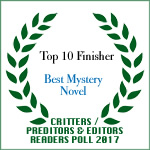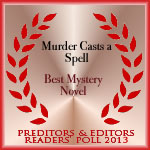 Clues are the building blocks of a good mystery novel. The kind of clues and their placement in the novel can make the difference between a simple, run-of-the-mill reader challenge, and the kind of complex puzzle mystery readers love. Clues have two purposes. One is to send the sleuth and the reader in a direction that leads to apprehension of the villain. The other purpose is to point the sleuth and reader in directions that lead to the wrong solution. This second kind of clue is called a “red herring.”
Clues are the building blocks of a good mystery novel. The kind of clues and their placement in the novel can make the difference between a simple, run-of-the-mill reader challenge, and the kind of complex puzzle mystery readers love. Clues have two purposes. One is to send the sleuth and the reader in a direction that leads to apprehension of the villain. The other purpose is to point the sleuth and reader in directions that lead to the wrong solution. This second kind of clue is called a “red herring.”
We’ll take a look at “red herrings” in another post. Today’s piece will deal with the first kind of clue.
The creation of real clues that guide readers through a maze that eventually leads to the culprit can be a difficult but never boring task for the mystery writer, but well worth the effort. Here are some strategies to consider. Create clues that
• can be misunderstood, sending the detective off in the wrong direction. The footprints outside the victim’s window belonged to a voyeur, not the murderer.
• can be interpreted more than one way. The note pinned on the victim’s door said, “This is your last chance. Do it or die.” It could have come from the murderer or a girlfriend talking up a sale.
• point to more than one suspect. Two empty wine glasses could point to a friend of the victim, the victim’s alcoholic mother, or the killer.
• are part of a sequence of events or a list of related items. Clues buried in this way might not be noticed.
• are couched in the middle of an emotional scene or one full of action. This strategy dwarfs the importance of the clue.
•are spaced throughout the story. Don’t have a clue dump at the beginning or end of the story.
• point to motive and opportunity for more than one suspect. The real killer’s motive should be expressed, but not emphasized.
Clues can be found almost anywhere—through forensics at crime scenes or in the background and relationships of the victim or murderer.
Gillian Roberts states in her blog: “A clue can be nearly anything—an action, a gesture, a speech pattern, attire…”(Writing Lesson #13)
Clues are fun for the mystery novelist to create and for the mystery buff to find and track.
More Writing tips:











I don’t have a clue what you’re talking about.
(grin)
LikeLike
By: Richard W Scott on July 2, 2011
at 10:09 pm
You’re funny.
LikeLike
By: nancycurteman on July 3, 2011
at 12:19 pm
Helpful ideas for a mystery writer. I have only done mystery scripts for dinner theatre but it was fun, often bizarre! I had a rather absurd way of putting these stories together and wish I had these tips at the time. My dramatic structures were inspired by Agatha!
LikeLike
By: An Embarrassment of Freedom on July 4, 2011
at 6:36 am
I love Agatha. She and Doyle are my mentors.
LikeLike
By: nancycurteman on July 4, 2011
at 8:34 am
I love this information. RIght now I am busy writing my first novel length story, and it is a fairly complex mystery/thriller. I find myself worried about whether or not I have enough clues in the story for both the reader and the detective. I don’t want a magical ening, I want it all to be there in the end. Your advice aids greatly.
LikeLike
By: jmcmurray on July 5, 2011
at 7:06 pm
I’m glad my post was helpful. When I write a mystery, I try to drop enough subtle clues throughout the story so that even though the ending is unexpected, the reader will say, “Right. I remember that clue. I just didn’t pay enough attention to it.” I strive for a surprise but reasonable ending.
Good luck on your thriller mystery novel.
LikeLike
By: nancycurteman on July 5, 2011
at 7:34 pm
How many clues do you need? I am in the middle of the story, prime Clue Time, but I only have ONE clue! I have everything worked out except the placement of clues. It is frustrating!
Also, what about secondary characters? I have a nice secondary story chugging along, but do they intersect?
Happy new year….I hope that you are still accepting emails!
LikeLike
By: Lee on January 1, 2013
at 5:38 am
By: Crime Scene Investigation Strategies « Global Mysteries on August 20, 2011
at 10:06 am
Lee, It is difficult to put an exact number on the number of clues needed in a mystery novel. The novel I’m working on now has five subtle clues buried in various sections of the story. I always relate my secondary characters’ stories to my main character’s story in some way. Be careful not to allow your secondary character stories to outshine that of the main character.
LikeLike
By: Nancy Curteman on January 1, 2013
at 6:10 pm
Your tips on writing a murder mystery novel are so helpful! Thanks for posting these tips there helping me write my murder mystery novel. 😀
LikeLike
By: Tiffany on August 30, 2013
at 8:55 pm
Tiffany, I so glad you find my writing tips helpful. Mystery is one of my favorite genres. Good luck in your writing.
LikeLike
By: Nancy Curteman on August 30, 2013
at 9:06 pm
[…] Clues: These are fun because they point to the suspects and their motives. Remember to be subtle and vary your type of clue. Make your clue work for you by implicating several suspects when interpreted in different ways. Here are a few types of clues: […]
LikeLike
By: Planning for Camp [the penultimate day] – Cayleigh Stickler on March 31, 2017
at 6:34 pm